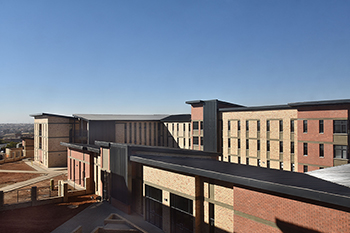Latest News Archive
Please select Category, Year, and then Month to display items
10 March 2022
|
Story Anthony Mthembu
|
Photo Unsplash
 The No Student Hungry team gearing up to start distributing food parcels to the selected students.
The No Student Hungry team gearing up to start distributing food parcels to the selected students.
The UFS is one of the many institutions of higher learning where food insecurity is an active issue. However, the
No Student Hungry Programme is one of the initiatives launched at the university to assist in fighting food insecurity at the institution.
The purpose of the programme
Since its inception in 2011, the initiative has assisted many students in acquiring a healthy meal. Additionally, the Food Environment Office also hands out food packages, so that students can continue to achieve academically. “We are trying to develop a healthy environment for students and make it easier for them to have a nice and healthy meal,” stated Annelize Visagie, who heads the Food Environment Office at the UFS. The Food Environment programme is spread out on all three campuses, each with its own facilitators. Furthermore, the programme mainly caters for students who are not funded by the National Student Financial Aid Scheme (NSFAS) but who are excelling academically. The abovementioned students apply for assistance online, and a list is then drawn up of students who receive assistance for the year.
Alternative solutions to keep the initiative running
On the Bloemfontein Campus, the No Student Hungry Programme will be catering for 200 students in the 2022 academic year, assisting them with a daily nutritious meal. Additional food parcels are also handed out to provide further assistance. “We give food parcels to the students on the list every Tuesday and Thursday at the Thakaneng Bridge,” Visagie highlighted. However, she argues that catering for the student population through this programme can be a challenge, as the demand for assistance is growing rapidly and the ability to assist is limited. The programme relies on partnerships and sponsors to assist the student body. In fact, the coordinators of the programme currently have a memorandum of understanding with Tiger Brands according to which they deliver around 100 food parcels for distribution.
In addition, the coordinators have put in place alternative measures to ensure that they can provide more food to students. “The
Kovsie Act Office, in partnership with the
Department of Sustainable Food Systems and Development, has started a food garden where healthy and nutritious produce are grown, in order to add value to the distribution,” she indicated. Although the programme can only assist to a point, students who are in desperate need of assistance are never turned away. In fact, the
Social Support Unit at Thakaneng Bridge usually assists students with food vouchers for a maximum of four days.
A commitment to teaching healthy eating habits
The programme is not only committed to curbing food insecurity, but also to ensuring that students have a healthy and balanced diet. As such, a booklet is being issued by the
Department of Nutrition and Dietetics in collaboration with the Department of Sustainable Food Systems and Development, which contains ways in which students can make a healthy meal using some of the ingredients offered in the food parcels.
“We want to teach students how to eat healthy in the cheapest way, because they don’t have a lot of money to buy expensive food products,” Visagie argued.
First residence for UFS South Campus
2016-09-01

The residence has 146 double rooms with 17 kitchens
overall, each corridor has one kitchen. The residence
also has a gazellie and a conference room that
can accommodate 50 people.
Photo: Charl Devenish
The South Campus of the University of the Free State in Bloemfontein now has its own student residence. Completed in June 2016, the new residence can accommodate 250 undergraduate and 20 postgraduate students.
The residence has 270 beds, with 20 single-bedroom flats and 12 additional single rooms in the corridors. Each of these single-bedroom flats has a kitchen, lounge, and a bathroom. There are 146 double rooms with 17 kitchens overall, each corridor has one kitchen. The residence also has a gazellie, a conference room that can accommodate 50 people, as well as eight laundry rooms with a drying area.
“Students at the South Campus have, up until now, been commuting from the Bloemfontein Campus and residential areas around town. We are extremely proud that accommodation will now be available to our students on the campus. Although the official opening of the residence is said to take place early in 2017, some students have already moved in,” says Prof Daniella Coetzee, Principal of the South Campus.
The residence was built at a cost of R57 million, which was funded by the UFS and the Department of Higher Education and Training.
Residence accessible to differently-abled people
The UFS strives to cater for differently-abled people by making all its buildings accessible to them. This residence is no exception, as it has two rooms available on the ground floor of Block C for differently-abled students. These rooms accommodate two students per room.
A one-of-a-kind newly installed water system
The residence is also the first at the university that has a grey-water system installed. Grey water is made up of bath, shower, and bathroom sink water. The water will then be reused for toilet flushing as well as for irrigation purposes on the campus.